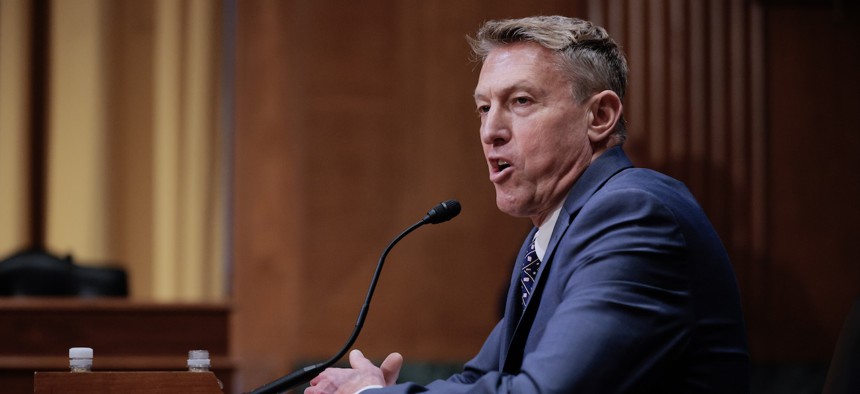
Rodney Scott, President Trump's nominee to be chief of Customs and Border Protection, prepares to testify during his confirmation hearing before the Senate Finance Committee on Capitol Hill on April 30, 2025. Chip Somodevilla/Getty Images
Trump’s pick to lead Customs and Border Protection confirmed by Senate
Rodney Scott, the former Border Patrol chief, returns to a key role in Trump’s immigration agenda—despite renewed scrutiny over a migrant death under his past leadership.
The Senate on Wednesday confirmed President Donald Trump’s nominee to lead Customs and Border Protection, a major role for carrying out the president’s border enforcement agenda and the handling of unauthorized migration.
In a 51-46 party-line vote, the Senate confirmed Rodney Scott of Oklahoma.
Scott previously served as the chief of the Border Patrol, an agency within CBP, during the first Trump administration and under former President Joe Biden.
During the first Trump administration, Scott implemented a policy that required asylum-seekers to remain in Mexico while their cases were pending in immigration court.
As the new head of CBP, Scott will oversee more than 60,000 employees. The agency also manages more than 300 ports of entry at borders, airports and seaports.
During his Senate confirmation hearing in April, the Senate Finance Committee’s top Democrat, Sen. Ron Wyden of Oregon, raised concerns about the 2010 death of an immigrant at a CBP station in San Diego that Scott ran.
Anastasio Hernández Rojas was detained by CBP officers and was beaten, later dying from his injuries, Wyden said.
“Rather than following the agency’s own policy and immediately referring the incident to outside investigators, the San Diego CBP office began its own investigation,” Wyden said. “In the course of that investigation, the CBP officers taped over the only video copy of Hernández Rojas’s death and tampered with physical evidence, according to court documents.”
The United States paid $1 million to settle a lawsuit brought by Hernández Rojas’s widow, and in 2015 the Justice Department declined to pursue federal charges against any of the officers or leaders involved in the case.
Homeland Security Secretary Kristi Noem sent a letter to the committee before Scott’s confirmation hearing and informed senators that the agency reviewed the 2010 incident and that Scott’s work “was in accordance with his duties, the law and professional standards.”






